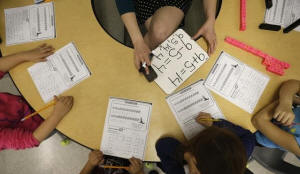|
Needy Illinois schools face anxiety over
looming state aid cutoff
 Send a link to a friend
Send a link to a friend
 [August 03, 2017]
By Dave McKinney and Julia Jacobs [August 03, 2017]
By Dave McKinney and Julia Jacobs
CHICAGO (Reuters) - Illinois’ most
financially distressed school districts appear capable of opening on
schedule this month, but some may face shutdowns in September and
possible bond-rating downgrades if $6.7 billion in state education
funding remains frozen by a new round of political deadlock.
The nation’s fifth-largest state, which recently ended a record-setting
two-year budget impasse when schools were fully funded, now faces a new
financial crisis triggered by Republican Governor Bruce Rauner's veto of
a Democratic-backed school-funding overhaul.
His move leaves Illinois without a budget for its schools for the
current fiscal year and could disrupt state aid for 850-plus districts
that educate 2 million students, including the nation’s third-largest
school system in Chicago.

Rauner argued the legislation was too generous to Chicago, depriving
suburban and rural school districts of funds. The legislature appears to
lack sufficient votes to block the governor's veto and Democrats do not
favor his changes, creating a high likelihood the entire package could
die.
On Wednesday, Fitch Ratings warned Rauner’s amendatory veto threatened
to deprive schools of state aid payments before their openings this
month and could result in downgrades for some Illinois’ school
districts, including junk-rated Chicago Public Schools (CPS).
“Should there be an extended impasse, ratings for the Chicago Board of
Education and other Illinois school districts with limited financial
flexibility could be at risk,” Fitch said in a statement.
CPS, which derives 30 percent of its revenue from the state and is one
of 19 cash-strapped districts on a state financial watch list, has vowed
to ride out any disruptions in funding and stay open.
Rauner justified his amendatory veto by criticizing the Democratic
school-funding measure for “unfairly” diverting hundreds of millions of
dollars to CPS at the expense of other school districts, setting the
stage for an override fight in the legislature that could play out
during the next two weeks.
If lawmakers do not block Rauner's veto, they will have to start from
scratch in drafting new school appropriations legislation for the
2017-2018 school year, which will require bipartisan, supermajority
support to pass.
[to top of second column] |

Teacher Jenna Rosenberg speaks to her first grade class at Walsh
Elementary School in Chicago, Illinois,
March 1, 2013. REUTERS/Jim Young

Administrators in some financial watch districts have begun
informing parents they may have to shut down if state funding is not
reinstated.
Some also have weighed short-term borrowing, ceased buying office
supplies and begun prioritizing bills to pay only the most essential
obligations until state money or property-tax collections arrive.
“We’re seriously considering paying salaries and the light bill and
water bill, and everybody else will have to wait,” said Mike Gauch,
superintendent of Harrisburg Community Unit School District 3, which
educates close to 1,900 students in this coal-mining town about 350
miles (563. km) south of Chicago.
Gauch, who has a pending line of credit with a local bank that the
district can utilize if necessary, has notified parents a state
funding cut-off could cause his district that derives about 55
percent of its revenue from the state to close in September or
October.
In Streator, Illinois, a farming community 100 miles southwest of
Chicago, schools have only enough resources to keep classrooms open
until late September, and the district cannot open a line of credit
until October or November, its top school administrator said.
“We’re preparing for the worst but hoping for the best,” said Matt
Wilkinson, superintendent of Streator Elementary School District 44.
(Editing by Matthew Lewis)
[© 2017 Thomson Reuters. All rights
reserved.]
Copyright 2017 Reuters. All rights reserved. This material may not be published,
broadcast, rewritten or redistributed.

 |